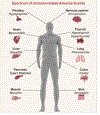Autoimmunity, checkpoint inhibitor therapy and immune-related adverse events: A review
- PMID: 31330185
- PMCID: PMC6980444
- DOI: 10.1016/j.semcancer.2019.06.012
Autoimmunity, checkpoint inhibitor therapy and immune-related adverse events: A review
Abstract
Immune checkpoint inhibitors have emerged as a remarkable treatment option for diverse cancer types. However, a significant number of patients on checkpoint inhibitors develop immune-related adverse events (irAEs) affecting a wide variety of organs. These events, which may reflect enhanced T cell activation, are unpredictable, heterogeneous, and in some instances permanent or life-threatening. It is not clear whether these toxicities are distinct from conventional autoimmune diseases or whether the manifestation of irAEs is associated with therapeutic efficacy. Studies across the spectrum of basic, preclinical and clinical research deciphering the role of genetics, epigenetics, gut microbiota and underlying immune status of patients who develop irAEs are required to gain a deeper mechanistic understanding. Insights gained from such studies will facilitate identification of biomarkers for optimal treatment and clinical management of patients. In this Review, we provide basic and clinical understanding of immune checkpoint inhibitors and irAEs. We discuss the connection between immune system, autoimmunity and cancer; immune checkpoint inhibitors and associated autoimmune toxicities; insights into potential underlying mechanisms of irAEs; impact of autoimmune diagnosis on cancer outcome; and management of irAEs.
Keywords: Autoimmunity; Immune checkpoint inhibitors; Immunotherapy; Toxicity and irAEs.
Copyright © 2019 Elsevier Ltd. All rights reserved.
Conflict of interest statement
Declaration of Competing Interest There are no conflicts of interest to declare.
Figures



References
-
- Grulich AE, van Leeuwen MT, Falster MO & Vajdic CM Incidence of cancers in people with HIV/AIDS compared with immunosuppressed transplant recipients: a meta-analysis. Lancet 370, 59–67 (2007). - PubMed
-
- Kasiske BL & Klinger D Cigarette smoking in renal transplant recipients. J Am Soc Nephrol 11, 753–759 (2000). - PubMed
-
- Friis-Moller N, Sabin CA, Weber R, d’Arminio Monforte A, El-Sadr WM, Reiss P, et al. Combination antiretroviral therapy and the risk of myocardial infarction. N Engl J Med 349, 1993–2003 (2003). - PubMed
-
- Graus F, Dalmou J, Rene R, Tora M, Malats N, Verschuuren JJ, et al. Anti-Hu antibodies in patients with small-cell lung cancer: association with complete response to therapy and improved survival. J Clin Oncol 15, 2866–2872 (1997). - PubMed
-
- Dalmau J, Furneaux HM, Gralla RJ, Kris MG & Posner JB Detection of the anti-Hu antibody in the serum of patients with small cell lung cancer--a quantitative western blot analysis. Ann Neurol 27, 544–552 (1990). - PubMed
Publication types
MeSH terms
Substances
Grants and funding
LinkOut - more resources
Full Text Sources
Other Literature Sources
Medical

